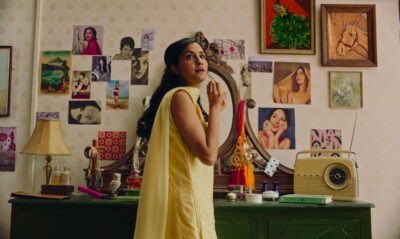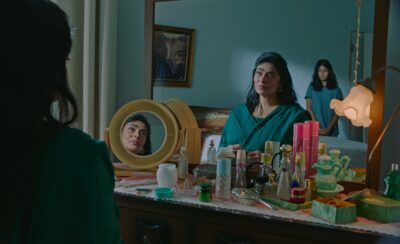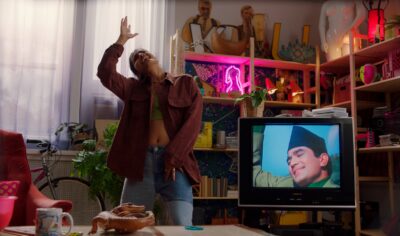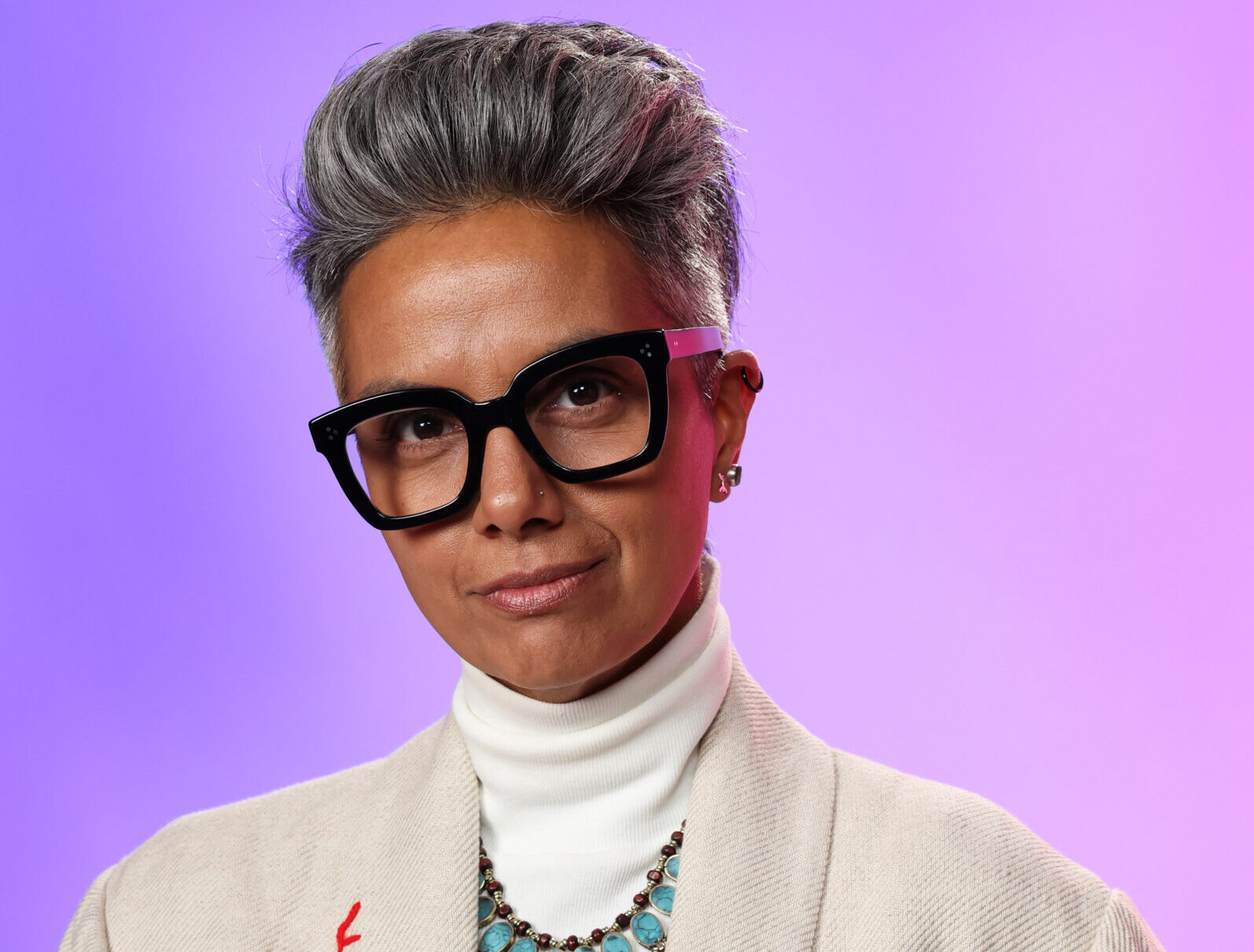Spanning 30 years, 3 generations of women, and 2 countries, The Queen of My Dreams is an epic, sweeping dramedy that packs an emotional punch.
In 1999 Karachi, 22-year-old Azra (Amrit Kaur) and her mother Miriam are reeling from the loss of Azra’s father. The story flashes back to a young Miriam, also played by Kaur, trying to find her own path in 1960s Pakistan, as well as scenes from Azra’s youth in Nova Scotia. Bollywood-inspired musical fantasy sequences punctuate this beautifully layered narrative.
Delving into the complexities of mother-daughter relationships, gender and sexuality, grief, and immigration, few films manage to unpack so many universal themes with the nuance and grace as The Queen of My Dreams. Blending genres and seamlessly travelling between time periods, this is a powerful look at the dynamics that pass from mother to daughter, with striking visuals, humour and romance that will keep you watching.
Filmmaker Fawzia Mirza went through her own years-long journey to bring this story to the screen. The film is closely entwined with Fawzia’s own journey of self-discovery, inspired by their own experience coming out as queer, and a nostalgic curiosity about their mother’s youth in Pakistan.
We were able to sit down with Fawzia ahead of the Toronto premiere of The Queen of My Dreams to dive into the themes of the film and talk about how she brought this beautiful story to life.
This is such a powerful film. In setting out to tell this epic story spanning 30 years, capturing the lives of 3 women across generations- what did the writing process look like for you?
It started with a short film that I made 10+ years ago that was called The Queen of My Dreams. I was trying to reconcile my identities, like could I be queer, Muslim and South Asian all at the same time? I was doing it in a very public way with a really private struggle. Making that and sharing that really saved my life.
I developed it into a one-person show, and it was only after that I realized maybe there’s a film in here. As much as the screenplay is inspired by an adaptation of the play, it’s also fantasy. What really helped me unlock the film was not being bound to what I know happened in my life—being loosely inspired by true things, but then going wherever we wanted.

Courtesy of Cineplex Pictures
As the story is based on your personal experiences and family, what emotions came up for you while creating The Queen of My Dreams?
The short film I made came out in 2012. If I had made this movie 12 years ago, it would have been a very different film. In performing the play, I really worked out some of the greatest struggles that I was having about why I am who I am, and why my mother might be who she is. The love and compassion that I found for myself, getting to this feature, I really wanted to center it for those who came before me.
The feelings that came up in writing were: How do I tell a story that centers compassion? How do I tell a story that doesn’t villainize the people that are stereotypically villainized when we tell Muslim stories or stories of women of colour, or stories of the Eastern versus the Western world? How do I tell a story that can still feel nuanced, but not demonize where I come from?
We see that nuance come through at the end of the movie, with the possibility of a way forward for Azra and Miriam. What did you want to explore about mother-daughter relationships?
The beginning of this relationship at the end of the film is in many ways a fantasy. What if we could begin again? What if we could find compassion for each other? What if mother and daughter could put all that stuff aside and see each other really clearly without all the baggage, but just with love? What might be possible?
Compassion is a way forward and I find compassion and liberation to be deeply intertwined. There’s a lot of fantasy in the film, but I think that moment of hope for an awesome friendship that might happen between mother and daughter—I think that’s the greatest fantasy.

Courtesy of Cineplex Pictures
These are themes a lot of queer people can relate to. What do you think the impact of seeing stories like this is for queer audiences?
Honestly, Bollywood is inherently queer, and Indian cinema is inherently queer. That is true of South Asian culture. There is an ancient understanding of gender being a little more fluid, and I wanted to share that.
I made my first short film because I didn’t see anybody who shared my identities on screen or in movies or anywhere. I didn’t even see them in my community. It was much more isolating. I started creating work because if I didn’t see it, I had to make it in order to believe that I could exist. I hope that folks can see themselves or see a way through in this film, and that they’re not alone. There’s so many people going through the same thing.
Azra also challenges gender roles several times throughout the film—from the Bollywood fantasy sequences to her father’s funeral. Why did you want to explore that?
The lesson I learned is you don’t have to throw away your fantasies in order to be exactly who you are. And reimagining these songs, these stories, these images in a queer light… you don’t have to go too far for it to feel completely authentic. It’s like, oh yeah, why couldn’t I be in this role? Who is the hero? Who is the heroine? It’s whoever you want it to be. You can be in whichever of those roles meets your needs and meets your truth and meets your authentic self.
The song Mere Sapnon Ki Rani, The Queen of My Dreams, I used to think that to find that great big romantic love some guy would have to sing that song to me. When I started coming out, I was like, wait, do I have to lose that dream and fantasy? No, it’s just gonna be a woman who will sing it to me. And then as I evolved in my personal growth and sense of self I realized no, I am the queen of my own dreams. Not anyone else’s. My dream looks exactly like I want it to and I can be in any role.
The expansion of the story is better for all of us. Queering the narrative allows there to be room for everybody, straight or not.

Courtesy of Cineplex Pictures
That song is so central to the film. Can you tell me more about your vision for the music in the film?
I’m so glad that my producers got the rights to the song because without it, it just wouldn’t be the same. That song was really the initial inspiration for all of it. I’ve been hearing it for years. It’s been remixed for years. It’s one of the songs that still will show up on dance floors all over the world. And that was the center point.
Music is inspiring for me in all my work. Music just is so visceral. We immediately conjure up our own emotions and experiences and we bring that to a moment in time. I love the nostalgia that music creates. I love the nostalgia of this song. I wanted songs that evoked memory throughout the film. Memory is so essential to telling stories in different time periods. I wanted all those layers.
So many people are seeing themselves in this film. What are some of your favourite reactions you’ve received so far?
One of my favourite reactions is people saying they’ve called their mom right away. I was like, oh my god, amazing!
People saying they’ve been laughing and crying during the film. That’s probably my favourite reaction because grief isn’t just one thing. It doesn’t look one way. Emotion doesn’t look and manifest in just one way. I love those layers—that is both my truth as a person and my truth in making this movie.
The Queen of My Dreams is now playing in theatres.



 Follow Us On Instagram
Follow Us On Instagram

 TICKET GIVEAWAY!!
TICKET GIVEAWAY!!  We’re giving awa
We’re giving awa
